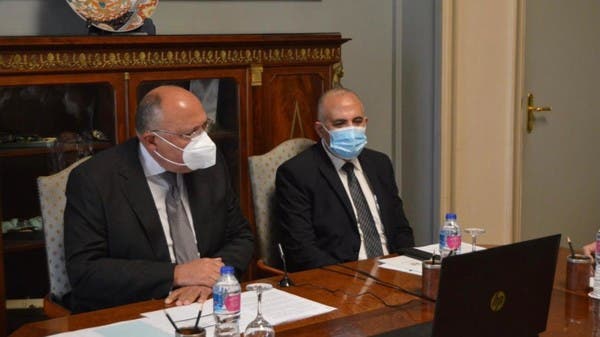In the last episodes of the complex Renaissance Dam crisis, the Egyptian Foreign Ministry stressed the need to reach an agreement as soon as possible before the start of the second phase of filling the dam reservoir during the Renaissance Dam meeting today, Sunday, in order to achieve the common interests of the three countries and to protect Egypt’s rights and water interests. Ethiopia insisted that it would “not accept any agreement that would limit its ownership of the Nile.”
Also, Egyptian Foreign Minister Same Shoukri and Irrigation Minister Mohamed Abdel Adi today attended a six-way cabinet meeting on the Grand Ethiopian Renaissance Dam.
Need to agree soon
In a statement, the Egyptian Foreign Ministry stressed the need to reach an agreement on the Cairo Renaissance Dam as soon as possible, before the second phase of filling the dam reservoir begins, to achieve the common interests of the three countries, as well as to protect Egypt’s rights and water interests.
According to the Egyptian Ministry of Foreign Affairs – the meeting ended in the presence of observers and experts participating in the negotiations appointed by the African Union Commission for a one-week round of talks between the three countries, with the aim of discussing the main features and controversial points of the Renaissance Dam Agreement. This weekend, another six-party ministerial meeting chaired by South Africa was held to review the outcome of the tripartite round of talks.
78% of the dam is building
The Ethiopian Ministry of Irrigation, on the other hand, said that the ministers of the three countries had exchanged views on the continuation of the tripartite talks, focusing on the draft document submitted by experts appointed by the President of the African Union, pointing to the completion of 78% of the construction of the Renaissance Dam.
The Ethiopian Roy expressed his positive view of the Addis Ababa draft document and expressed his willingness to use it as an integrated work document for the Tripartite Negotiations, confirming the agreement on most of the issues related to the first filling and revitalization of the dam.
Ethiopia insisted that it would not accept any agreement restricting the right to use the Nile water in any way, indicating its commitment to conclude negotiations in good faith to reach an agreement.
For its part, the three countries reviewed their positions on the possibility of reaching a formula that would allow the Sudanese Ministry of Irrigation to resume negotiations in light of the positive developments that African experts have submitted to the three countries.
Renaissance dam negotiations
Obscure role for experts
Sudan welcomed the development, saying it was not enough because experts did not have a clear role to play in facilitating negotiations and proposing solutions to future problems.
The meeting ended this week with the implementation of Sudan’s proposal to dedicate itself to bilateral meetings between the three countries and a group of experts and observers.
The South African delegation called for these meetings to be dedicated to recognizing the agreement and differences between the three countries, in the hope that the tripartite meetings would reconvene on Sunday, January 10, and that the talks would end by the end of this January and precede the conclusion of the African Union meeting in South Africa.
It is noteworthy that the three countries have held several rounds of talks since Ethiopia began implementing the project in 2011, but have so far failed to reach an agreement on filling and operating the largest reservoir behind the 145-meter-long Renaissance Dam.
The last round of video conference talks, held in early November, ended without progress.


:quality(85)/cloudfront-us-east-1.images.arcpublishing.com/infobae/BH6NLAQGXJGADFWTENBUV7Z7RQ.jpg)
:quality(85)/cloudfront-us-east-1.images.arcpublishing.com/infobae/3GK63ATFOMFAYNUAQKUL4WUJFM.jpg)

:quality(85)/cloudfront-us-east-1.images.arcpublishing.com/infobae/SJ35ZLSJ5NB4BWVRJPSK74P7AQ.jpg)